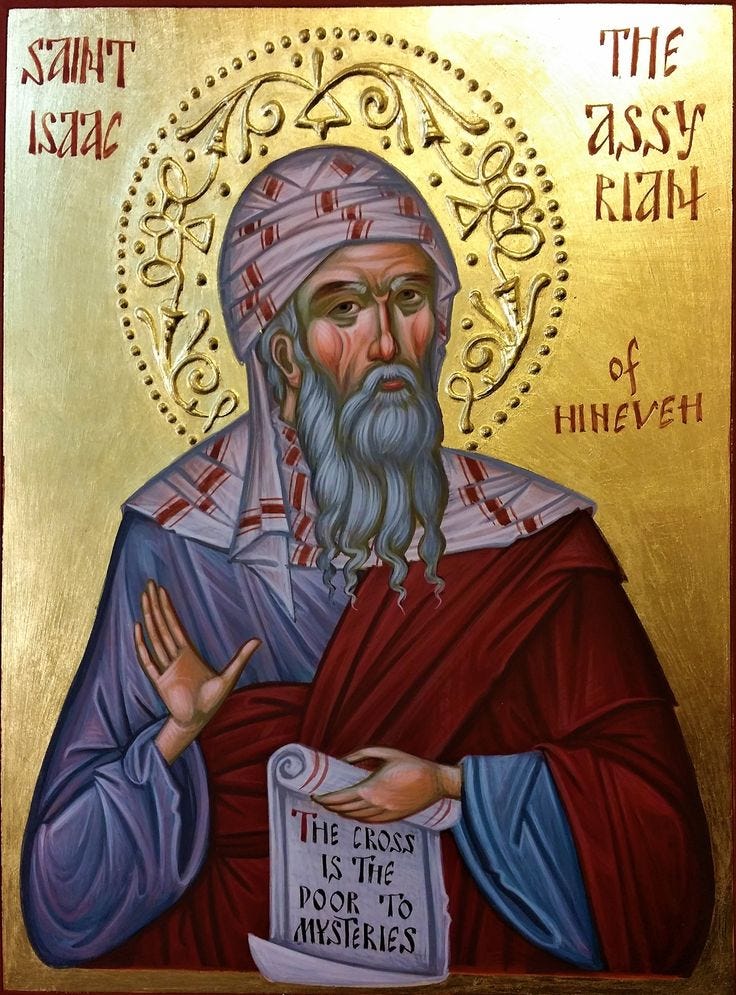Canonizing Confusion
In his first week, Pope Leo XIV declared Francis in Heaven and praised a universalist schismatic as a saint. Far from a restoration, this is a reinforcement with better vestments.
Pope Leo XIV has spoken and the message is clear. Not through encyclicals or declarations, but through liturgical signals, symbolic gestures, and the company he keeps: living or dead.
In his Regina Caeli address on May 18, Leo said: “During Mass, I strongly felt the spiritual presence of Pope Francis accompanying us from Heaven.” There was no “may he rest in peace,” no theological caution, and no appeal to mystery. Just a public declaration at St. Peter’s placing Pope Francis in the Communion of Saints, as if canonization is assumed instead of being discerned. This is not a throwaway line, but rather the theological endorsement of the Francis papacy delivered from the altar.
Four days earlier, on May 14, Leo praised Isaac of Nineveh, a seventh-century bishop who died outside communion with Rome, belonged to the Assyrian Church of the East (a Nestorian sect), rejected the Council of Chalcedon, and advocated a mystical universalism, including compassion for demons. He had previously been scandalously added to the Roman Martyrology by Francis. Leo quoted Isaac approvingly and called him “a great Eastern Father.” The official Vatican transcript refers to him as “Saint Isaac of Nineveh.” This is not a scholar citing a distant theologian, but rather the pope presenting a heretical mystic as a spiritual authority without clarification, context, or concern.
What links Francis and Isaac? They are canonized not by dogmatic discernment, but by emotions and ecumenism. Francis is elevated for being merciful and modern. Isaac is praised because he is an Orthodox “Saint.” In both cases, doctrinal rupture is forgiven for the sake of pastoral and ecumenical sentiment. Truth is being replaced by tone and politics.
There was a moment, brief and early, when it seemed Leo might take a quieter path. That perhaps he would let the chaos of Francis fade, restoring tradition by slow neglect. But that illusion is gone. Not with formal declarations, but with unmistakable symbols. Leo now says Francis is in Heaven and that Isaac is a saint. The postconciliar agenda continues. This is far from a reform of the Francis and post-Conciliar papacies. Instead it is a reaffirmation of both with Latin and lace.
We are being told that one can be outside the Church and still be a “saint.” That one can propagate universalism and still be spiritually reliable. That one can wreck doctrine and still be canonized by sentiment. This is not Catholicism, it is canonized confusion.
And many will remain silent, as long as the incense is thick and the Latin is chanted. But the faithful deserve clarity. And clarity begins by saying what this is: not renewal, not restoration, but reinforcement of the very agenda many reviled for twelve long years under Francis.







I'm glad I found someone else talking about the bombshell from Leo. I had suspected that he was a brilliant genius, perhaps a saint, who was using language to reverse to Marxist infiltration in the same way it happened, by ascribing a different meaning to words from what they intended, a more orthodox meaning, so as to unite the 2 sides of the Church and bring peace.
I see his statement about Francis as being imprudent presumption and also there are many effects from it, disharmony, distrust, fear. I wonder how the Chinese Catholics feel about Francis being in heaven?
He didn't answer the dubia or claims he didn't believe in hell or whatever, he caused confusion, he made a mess.
It was disappointing to realise a different man to the one I had imagined. It was the perfect opportunity to get things back on track.
What does the Church teach about canonisation as an infallible act?
It was quite a short honeymoon. I wonder how the enthusiasts will spin LXIV’s inaugural address, which could have been delivered by any liberal Protestant bishop anywhere at any time.